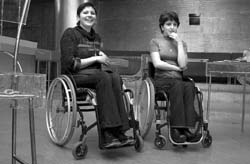Last Tuesday Kyiv elected Miss Wheelchair

This was the FALBI-2003 International Open Contest for the Disabled. Thirty Ukrainian women opted for participation in the contest, with only seven of them getting through the first round and three making it to the finals. Among the nominees for the Miss Ukraine title there were also foreigners from Bulgaria, Russia, and Belarus. The fates of all six finalists have much in common. All the girls became handicapped due to accidents and are brave enough to withstand their travails. Luhansk- based Olena Rozhkova, 23, is ready to enter the pedagogical university’s Psychology Department in order to after graduation help disabled children to adjust to their lives. After her surgery she was frightened of people for two years, but later learned to simply ignore their sympathetic looks. “One can be happy even in a wheelchair,” she says. “It depends on oneself, as well as on people’s attitude towards the handicapped. We don’t need pity; what we really need is equal treatment, since a wheelchair doesn’t mean the end of one’s life. The main thing is to stop pitying oneself and learn to live under new conditions. This is much more complicated than building ramps.”
Natalia Pitsun from Lviv oblast, 26, used to work as a salesgirl before her accident. A serious trauma took her aback, but later she decided to get some education and continue working in sales, since she wanted very much to work with people.
Olena Kononovych from Kharkiv oblast learned to deal even with the stairs on her own. For her, there is no such thing as unsolved problem. “I always keep smiling,” Olena says. “I’m a very cheerful person. I came to the contest to show people that one can preserve his or her individuality in any situation.”
Olesia Gladysheva (Russia) and Olena Galkina (Belarus) are convinced that people in wheelchairs are very strong. Everybody who attended the fest’s final rehearsal could see this firsthand. The girls need to have strong backbone and arm muscles and precise coordination of movements not to break the dance pattern, turning the wheels and simultaneously performing dance movements with their hands. The only girl who danced onstage before her accident was Bulgarian Lidia Vasilieva, who studied dance professionally from her childhood at a ballet school at the Varna Opera Theater. At present Lidia is studying by correspondence at two universities simultaneously. She is going to become a lawyer and believes she is a full member of society. What struck Lidia most in our country was the Ukrainians’ friendliness and readiness to render support.
The contestants competed in figure wheelchair driving, telling about themselves, dancing, and making flower compositions. The contest organizer, Head of the IP Fund Charitable Foundation of the Disabled Mykola Podrezan, told The Day, “I am a happy person, because I like my job and my country appreciates it. When I found myself in a wheelchair, I was already 38. I understood that we, the disabled, have to prove to the healthy that we are completely full-fledged people. We have the same needs as they do: losing and winning, smiling and crying, getting married or divorced, dancing... A show seems the best way to demonstrate this. We have hold the first all-Ukrainian girls contest in 1996, and Knights on Wheels for the young men in 1998. Today these contests have become a fine tradition. I want this contest to fully present all sides of a young woman’s life. The winning criteria are a rich internal world, education, beautiful appearance, ability for self-development and teamwork. Every year the contestants demonstrate more and more willpower and self-control.”






